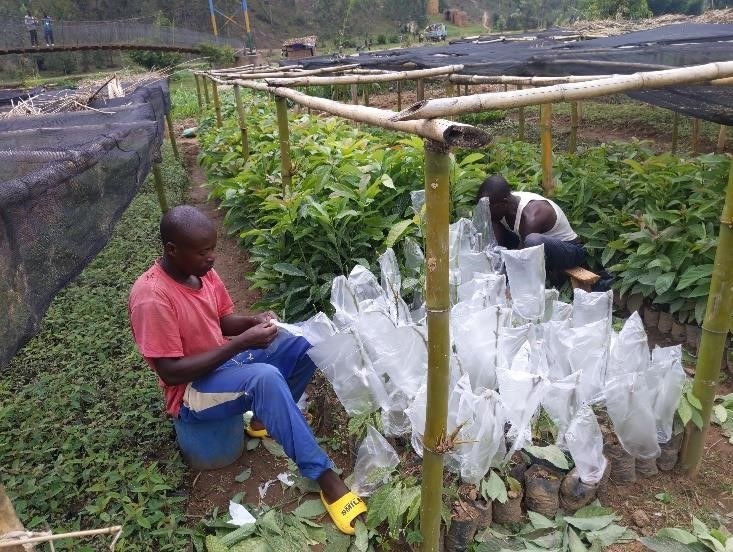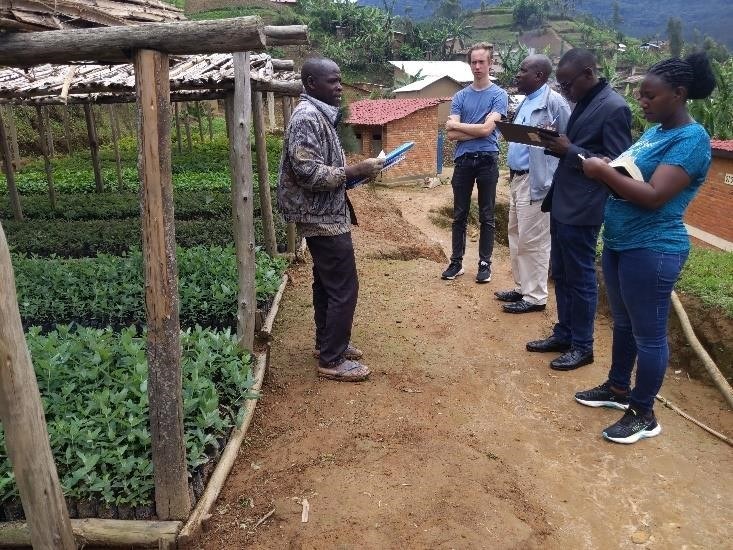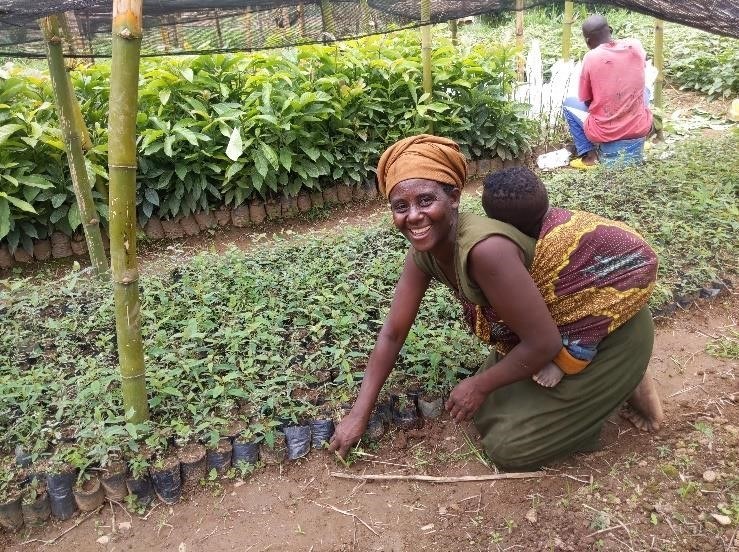2023 Tree Nursery Project Report
Rwanda Action partners with RDIS (Rural Development Inter-Diocesan Service www.rdis.org.rw) to estabish Community Tree Nurseries. The following summarises a report written by Eric Bagenzi, Director of Environmental Care and Disaster Risk Reduction, RDIS.
Introduction
Deforestation is a challenge in Rwanda, particularly in the districts of Rusizi and Nyamasheke where Rwanda Action operates. The Tree Nursery Project addresses the diminishing supply of wood and non-wood forest products, declining environmental services and the alarming reduction in biodiversity. The repercussions of deforestation extend beyond ecological concerns, manifesting in increased fuel wood costs, both in terms of monetary expenditure and the unproductive time invested in fuel wood collection. The Project has played a pivotal role in forest landscape restoration in the two districts.
Nyungwe Forest
In 2023, RDIS & Rwanda Action, successfully implemented a comprehensive project dedicated to seedling preparation, encompassing forestry, agroforestry, and fruit trees. The five tree nurseries resulted in the production and distribution of over 150,000 seedlings. These seedlings were given to smallholder farmers, making a tangible impact on the local environment, as well as contributing to the broader goals of sustainable development.
In Nyamasheke district, the tree nurseries were established in Bushenge and Kanjongo sectors. In Rusizi district, they were in Bweyeye, Nyakabuye, and Nzahaha sectors. Through strategic planning, these tree nurseries seek to address crucial environmental issues, such as soil erosion reduction, oxygen provision, soil preservation, reforestation, and the cultivation of food-bearing trees. They are crucial to the goal of realising a sustainable and resilient future for Rwanda's landscapes.
Activities and timeline 2023
January |
Selection and confirmation of location of tree nursery sites |
February |
Selection and training of new tree nursery bed managers |
March |
Planning meeting with bed managers Plot hiring and tree nursery rehabilitation Seed bed preparation |
April, May |
Purchase of seeds and transplanting bags Seeding and irrigation |
May to August |
Transplanting from seedbeds to bags |
July to early August |
Avocado fruit grafting |
Early October to December |
Seedling distribution and planting |
Ongoing during seedling growth |
Weeding, pest and disease control |
Ongoing |
Project monitoring and follow up |
Seedlings produced at each nursery site:
Kanjongo 30,474
Bushenge 30,734
Bweyeye 30,410
Nyakabuye 30,200
Nzahaha 30,080
Total seedlings 151,898
Tree Species grown included:
Grevillea robusta, Cedrella, Calliandra, Eucalyptus saligna, Eucalyptus maiden, Passionfruit, Tree tomato, Avocado, Orange.
Grafting fruit trees

Each site was anticipated to produce a total of 30,000 seedlings, contributing to an overall expected production of 150,000 seedlings. Remarkably, the actual production surpassed expectations, totaling 151,898 seedlings. However, it's noteworthy that during the distribution process and transportation to plantation sites 684 seedlings incurred damage. Despite this, a substantial number of 151,214 seedlings were successfully planted out, underscoring the resilience of the project in achieving its intended objectives.
Distribution of seedlings
The seedlings were distributed to farmers and planted out. This distribution took various forms, including providing seedlings directly to smallholder farmers for cultivation on their private land. Additionally, allocations were made to schools for educational and environmental purposes, while some seedlings were designated for cultivation on public lands during community work (Umuganda) and churches, specifically for erosion control and landscape restoration initiatives. This multifaceted distribution strategy aimed to maximize the impact of the project across various sectors, aligning with its overarching goals of environmental sustainability and community engagement.
Direct Categories of beneficiaries planted trees |
Number of trees planted |
Small holder farmers |
112,769 |
School |
15,812 |
Churches |
6,734 |
Public land, planted during community work (Umuganda) |
15,899 |
Total |
151,214 |
Feedback from some project stakeholders
Testimonial from Tree Nursery Bed Manager
“I, Mathias, serving as the tree nursery site manager for Bweyeye site, express my gratitude for the invaluable impact of the tree nursery project. Having dedicated my second year to this project, I have witnessed a transformative change in our community. The provision of readily available seedlings has proven instrumental, as it alleviates the financial burden on individuals who previously had to purchase seedlings at considerable expense. The project has undoubtedly brought about positive shifts, making afforestation and tree planting more accessible and sustainable for the local residents.”

Testimonial from an employee at Kanjongo Tree Nursery Site
“I am Adelphine, currently employed at the Kanjongo tree nursery. I find great significance in my role here as it directly contributes to the well-being of my family. While the financial compensation may not be substantial, it serves as a valuable means of support for my family, covering essential needs. Additionally, the income generated from my employment enables me to acquire necessary materials for my studies. I am genuinely thankful for this opportunity that not only supports my family but also contributes to my educational pursuits.”

The Tree Nursery Project also provides employment to unemployed youth.
Challenges and Resolution Measures
During the course of the project, several challenges were identified, prompting proactive measures to ensure the project's success. The challenges encountered, along with their corresponding resolutions, are outlined below:
ISSUE |
RESOLUTION |
Poor Germination of Some Seeds (Orange, Cedrella and Tree Tomatoes) |
A corrective action was taken by diversifying the seed selection, incorporating additional species that demonstrated robust germination. |
Low Construction and Rehabilitation Costs for Nursery Beds |
Recognizing the suboptimal quality and strength of the nursery beds constructed, measures were undertaken to enhance the construction quality, ensuring that the beds meet the required standards |
High Demand from Farmers for Seedlings |
In response to the heightened demand for seedlings, a comprehensive strategy was implemented to ensure the planting of all produced seedlings. This proactive measure addressed the surge in farmer interest and aligned with the project's objectives. Making other aligned proposal to search more funding. |
Conclusion
This Environmental Conservation Project in the Western Province of Rwanda stands as a testament to RDIS’s and RA’s commitment to safeguarding the environment and promoting sustainable development. Spanning from March to December 2023, this project has made significant strides in addressing critical environmental challenges. The overarching goal of mitigating the adverse effects of deforestation has been pursued with dedication and precision. The establishment of five tree nurseries, the meticulous preparation and distribution of over 151,214 seedlings, and the strategic planting across sectors have collectively contributed to the restoration of forest landscapes and the promotion of biodiversity.
The testimonies from the Tree Nursery Bed Manager and a Beneficiary employed at Kanjongo Tree Nursery site underscore the tangible impact of the project on individuals' lives and the community at large. Furthermore, the challenges encountered during the project were met with resilience and strategic solutions, showcasing adaptability and foresight in ensuring the project's success.
In summary, the Environmental Conservation Project serves as a beacon of success and a model for future endeavors in the pursuit of a healthier and more sustainable environment for the communities we serve.
Many thanks to Eric Bagenzi, Director of Environmental Care and Disaster Risk Reduction, RDIS, for leading a successful joint venture.
